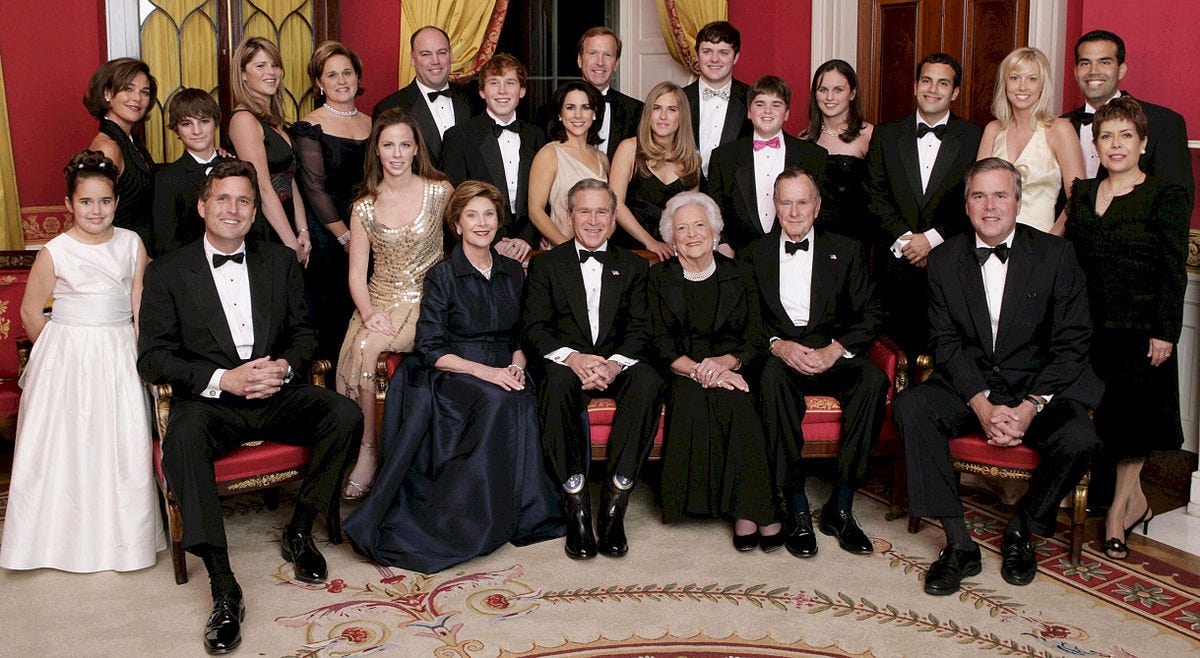What Kennedy dynasty?
The real political dynasties were the Bushes and the Clintons, and their standing has plummeted, along (thankfully) with the idea of political dynasty.

We’re seeing a lot of gloating over the defeat of Joe Kennedy, an impressive 39 year-old representative who rather arrogantly challenged the well-established and notably effective Sen. Ed Markey in Tuesday’s Democratic primary. Neither candidate could claim plausibly to be the outsider, but Markey successfully sold himself as one, and crushed Kennedy by ten points.
Some people are celebrating this as an overdue comeuppance for the Kennedy family. But the Kennedys have been feasting on comeuppances for decades. The Kennedy dynasty bid American farewell 40 years ago with Ted Kennedy’s failed bid to seize the Democratic nomination from Jimmy Carter. I was in Madison Square Garden for Kennedy’s “The Dream Shall Never Die” speech. It was August 1980, and I was a summer intern for the New Republic. The crowd went wild, but—greenhorn though I was—I just felt depressed, because it was so blazingly clear that the dream was stone cold dead. Kennedys might pick up lesser political offices here or there, but Camelot wasn’t coming back. Not long after, Garry Wills published the first (and still the best) dynastic obituary, aptly titled The Kennedy Imprisonment.
People continued, mostly out of habit, to imagine that the Kennedy dynasty lived on, egged on by nostalgia and by Ted Kennedy’s stature as a Senate lifer. (The runt of the Kennedy litter ended up changing America “more completely than any other member of his storied political family,” I wrote when he died.) But after 1980 the torch was already passing, not only to a new generation, but also to a new political family, the Bushes. A few years later, the Clinton family had its own run at dynastic politics. The Bushes and the Clintons were the dynasties that mattered after 1980, and they didn’t need adoring photo spreads in Life magazine to seize control of their respective political parties.
In the ten presidential contests between 1980 and 2016 there were only two, 2008 and 2012, that lacked a Bush or a Clinton on the ticket (and even one of those included the son of a onetime presidential contender, George Romney). A Bush family member participated in seven of these elections, compared to only four that featured Kennedys (1960, 1968, 1972, and 1980). The Clinton family participated in three. But 2016 turned out to be (among many other things) a sort of Waterloo for dynastic politics. Jeb Bush’s primary defeat and Hillary Clinton’s Electoral College defeat are seldom considered the same phenomenon, but I think they were. The American voter was getting fed up with the Bush and Clinton dynasties. And since these dynasties didn’t have much in common, it seems reasonable to conclude that 2016 was a referendum against political dynasty itself.
Matt Bai, writing in the Washington Post, says that Joe Kennedy’s primary loss this week was “a resounding defeat for the notion that family brands matter more than party or ideology in American politics,” and that that spells trouble for the “seven Trumps, Trump spouses, and significant others” (not counting el jefe himself) who elbowed their way into speechifying at this year’s Republican convention. But I can’t bring myself to believe that any of these pretenders ever had the slightest chance to jostle their way onto a national ticket.
According to the Atlantic’s McCay Coppins, Donald Trump, Jr. has the brightest political future of the five Trump children, but he may also be the dumbest. “He’s not the sharpest knife in the drawer,” Coppins quoted the president telling an aide. Coppins, noting that a running skit on Saturday Night Live portrayed Don “as the smart, responsible big brother and Eric as a kind of bumbling man-child,” reported that “within the Trump family, associates say, the brothers’ roles are exactly reversed.” Ouch! Which is not to say that Eric is anybody’s idea of a plausible political candidate either.
But look, now I’m doing it. Assessing the next Trump generation, one of them still a minor, as a potential future force in American politics serves only to legitimize the whole dubious idea of political dynasty. And anyway, there’s no particular reason to believe that, after four decades of Bushes and Clintons, Americans have much taste for it. The last dynastic scion to inhabit the White House was George W. Bush, who despite winning two terms in office left it with his reputation in shreds. The last two dynastic scions to run for president both lost to Donald Trump, the absolute worst presidential candidate in living memory. Sometimes I imagine an exasperated George H.W. Bush talking to Jeb Bush after he pulled out of the primaries, and an exasperated Bill Clinton talking to Hillary Clinton after the general results came in. I know this didn’t happen, but I like to think they both said the same thing. Your were up against Donald Trump. Exactly how easy did you expect me to make this for you?
We’re way past wondering whether the Kennedy “brand” or the Bush “brand” or the Clinton “brand” maintains popular appeal, or whether a Trump “brand” has potential. It’s the Dynasty Brand that nobody’s buying. Let’s hope it stays that way for a good long time.



